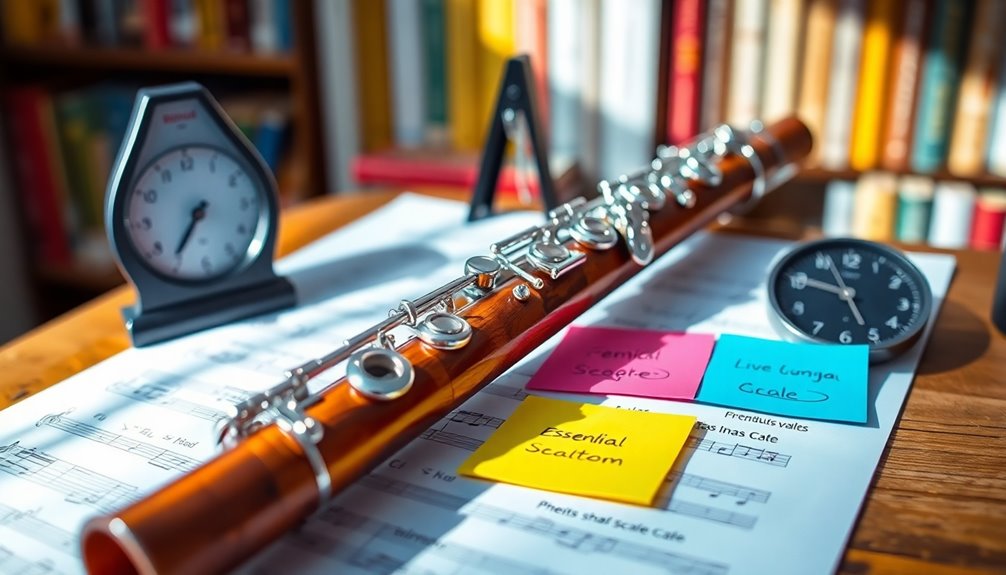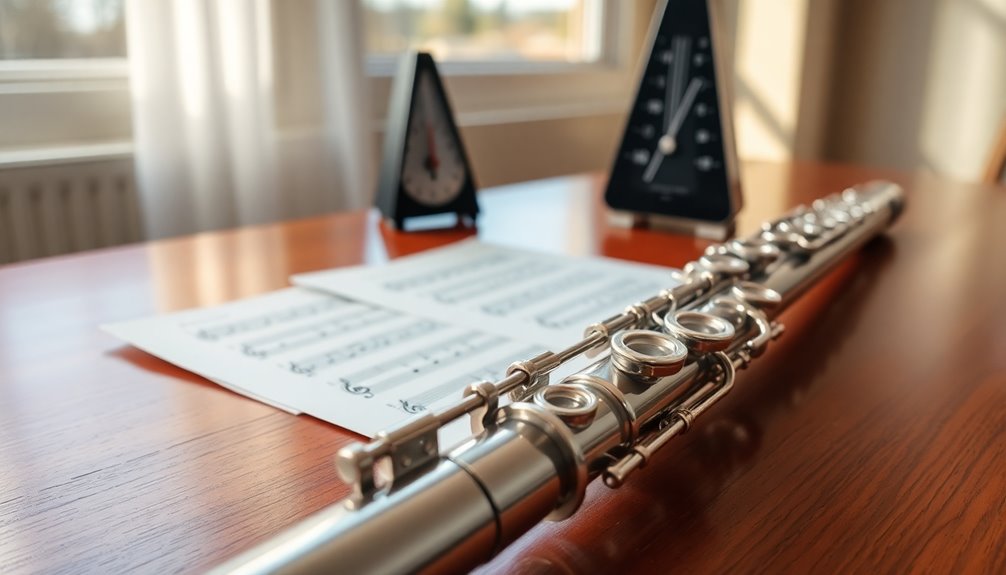To start with flute scales, you should focus on the C major scale, which uses all natural notes. This will help build your confidence and understanding of note relationships. Once comfortable, move on to G major and D major scales to expand your musical vocabulary. Don't forget to include the A minor scale for emotional variety. Make sure you practice regularly, beginning slowly and increasing your tempo over time. Incorporating rhythmic variations can keep your sessions fresh and engaging. As you explore these scales, you'll find even more techniques and resources to enhance your skills ahead.
Key Takeaways
- Begin with the C major scale, focusing on all natural notes to build a solid foundation.
- Progress to G major and D major scales to expand your musical vocabulary.
- Incorporate the A minor scale for emotional variety while sharing notes with C major.
- Practice both natural and harmonic minor scales for a deeper understanding of musical expression.
- Establish a structured routine, dedicating time daily to scale practice for consistent improvement.
Importance of Scales in Learning

Scales are the building blocks of your flute journey and play a vital role in developing your skills. When you engage in scale practice, you're not just repeating notes; you're laying a solid foundation for your musical abilities. The benefits of scales extend far beyond just finger dexterity. They help you understand the relationship between notes, improve your intonation, and enhance your overall musicality.
As you practice scales, you'll notice an increase in your confidence. Familiarity with different scales allows you to tackle more complex pieces with ease. You'll find that scales develop your ear, allowing you to recognize pitches and harmonies. This skill is invaluable as you progress, giving you the ability to improvise and play along with others.
Incorporating a variety of scales into your routine will keep your practice sessions fresh and engaging. You can start with major and minor scales, then expand into modes and arpeggios as you grow more comfortable. Remember, it's not just about speed; focus on clarity and tone. Practicing scales in different octaves can also enhance your dexterity and understanding of the flute's range.
Set small, achievable goals for your scale practice. Celebrate your progress, and don't hesitate to reach out for support from fellow flutists. You're part of a vibrant community, and sharing your journey with others can foster a sense of belonging.
Embrace the process, and you'll find that the time you invest in scales will pay off greatly in your overall flute playing.
Essential Scales for Beginners

Building on your understanding of why scales are important, it's time to focus on the specific scales that are fundamental for beginners. The two primary types of scales you'll want to master are major scales and minor scales. These scales are the building blocks of music, and learning them will give you a solid foundation as you begin your flute journey.
Start with the C major scale. It's often the first scale taught to beginners because it uses all the natural notes—C, D, E, F, G, A, and B. Practicing this scale will help you get comfortable with finger placements and improve your tone.
Once you've got C major down, move on to other major scales like G major and D major. Each new scale will introduce you to different sharps and flats, broadening your musical vocabulary.
Next, immerse yourself in minor scales, which add a different emotional quality to your playing. The A minor scale is a great starting point, as it shares the same notes as C major but has a different feel.
Exploring both natural and harmonic minor scales will enrich your understanding of music and how to express yourself on the flute, and mastering these scales will also enhance your finger dexterity, crucial for developing overall fluency on the instrument.
Practicing Scales Effectively

As you commence your journey of mastering flute scales, it's essential to establish a structured practice routine that maximizes your progress. Start by dedicating specific time slots each day to focus solely on scale exercises. This consistency will help you internalize the fingerings and improve your muscle memory.
Begin with one scale at a time, playing it slowly and accurately. Once you feel comfortable, gradually increase the tempo. Incorporating rhythmic variations into your practice can make this process more engaging. For instance, try playing the scale in different rhythms, such as dotted notes or triplets. This not only challenges your technique but also enhances your musicality.
Make sure to warm up before diving into scales. A few long tones followed by simple exercises can set a solid foundation for your practice. Remember to listen closely to your sound and intonation as you play. This auditory feedback is vital for improvement.
Don't hesitate to mix in some fun by playing along with recordings or using a metronome. You can even record yourself to track your progress over time. Surround yourself with fellow flutists, whether in person or online, to share experiences and tips. This sense of community can be incredibly motivating. Additionally, setting specific, measurable goals during your practice can provide direction and motivation for your scale exercises.
Ultimately, practicing scales effectively is about finding what works best for you and staying committed. Celebrate your achievements, no matter how small, and enjoy the journey of becoming a skilled flutist!
Tips for Improving Scale Practice

Improving your scale practice can make a significant difference in your overall flute playing. To get started, focus on establishing a consistent routine. Set aside dedicated time each day, even if it's just 10-15 minutes, to practice your scales. This regularity helps reinforce muscle memory and builds your confidence.
Next, incorporate various scale patterns into your practice. Instead of just playing scales in a linear fashion, try playing them in thirds, sixths, or octaves. These patterns not only make your practice more engaging but also enhance your technical skills. Switching up the order of the scales you practice keeps things fresh and exciting!
Additionally, don't underestimate the power of finger exercises. These can help you develop dexterity and speed, which are essential for playing scales smoothly. Simple exercises like the "Hanon" series can be adapted for flute, focusing on finger coordination and agility. As you work through these exercises, pay attention to your finger placement and verify your movements are fluid.
Finally, always listen to yourself while you play. Recording your practice sessions can provide valuable insights into areas that need improvement, whether it's tone, timing, or technique. Incorporating breath control techniques into your practice can further enhance your overall performance quality.
Resources for Further Learning

When you're ready to take your flute playing to the next level, exploring additional resources can be incredibly beneficial. There's a wealth of information out there that can help you master scales and enhance your overall musicianship. By diving into online courses and utilizing scale apps, you can make your practice sessions more engaging and effective.
Here's a quick overview of some great resources you can check out:
| Resource Type | Examples |
|---|---|
| Online Courses | MasterClass, Udemy |
| Scale Apps | Tonal Harmony, Smart Scale |
| YouTube Channels | The Flute Practice, Flute TV |
| Sheet Music Sites | MusicNotes, Flute Sheet Music |
Online courses often offer structured lessons with expert instructors, allowing you to learn at your own pace. You'll find a variety of topics, from basic scales to advanced techniques. Scale apps, on the other hand, provide interactive ways to practice scales, often featuring exercises and feedback that can help you track your progress. Many of these resources also include essential flute method books, which can serve as valuable references in your learning journey.
Frequently Asked Questions
How Long Should I Practice Scales Each Day?
You should aim to practice scales for about 15 to 30 minutes each day.
This daily practice helps you build muscle memory and improve your technique. With good time management, you can easily fit this into your routine.
Start with shorter sessions and gradually increase the time as you gain confidence. Remember, consistency is key, and every bit of practice counts.
You'll feel a sense of belonging as you progress together with others on this journey!
Can I Skip Certain Scales as a Beginner?
You might wonder if you can skip certain scales, but every scale has its importance. Skipping them can lead to beginner mistakes, like missing out on essential techniques and fingerings.
Instead, focus on mastering a few key scales to build your confidence and skill. Embrace the challenge, practice consistently, and remember that each scale adds to your musical foundation.
You're not alone in this journey; every musician started where you're now!
What Is the Best Flute for Practicing Scales?
When choosing the best flute for practicing scales, consider beginner instruments like the C flute. This type offers a solid foundation, making it easier for you to develop your skills.
Look for models with a silver-plated body for better sound quality and durability. Brands like Yamaha and Gemeinhardt provide reliable options that suit your needs.
Should I Practice Scales With a Metronome?
Practicing scales without a metronome can feel freeing, but you might miss out on essential rhythm skills.
Using a metronome brings structure, helping you develop practice consistency and timing. The benefits of a metronome are clear: it trains your ear and keeps your tempo steady.
Embrace this tool; it'll guide your progress and enhance your playing. You're not alone on this journey—many musicians find their groove with a metronome by their side.
How Do I Know if I'm Playing Scales Correctly?
To know if you're playing scales correctly, focus on your scale techniques and sound quality. Listen closely to your tone; it should be clear and consistent.
Record yourself and compare it to professional recordings to spot differences. Practicing slowly can help guarantee accuracy.
Don't hesitate to ask for feedback from teachers or fellow musicians—community support is invaluable.
With time and dedication, you'll notice significant improvements in your playing!
Conclusion
Incorporating scales into your flute practice is key to becoming a skilled musician. You've laid the groundwork by learning essential scales and effective practice techniques. Remember, Rome wasn't built in a day, so be patient with yourself as you progress. Keep challenging yourself, and don't hesitate to explore additional resources for support. With dedication and consistent practice, you'll see your skills soar. Embrace the journey, and soon enough, you'll be playing with confidence and artistry.






